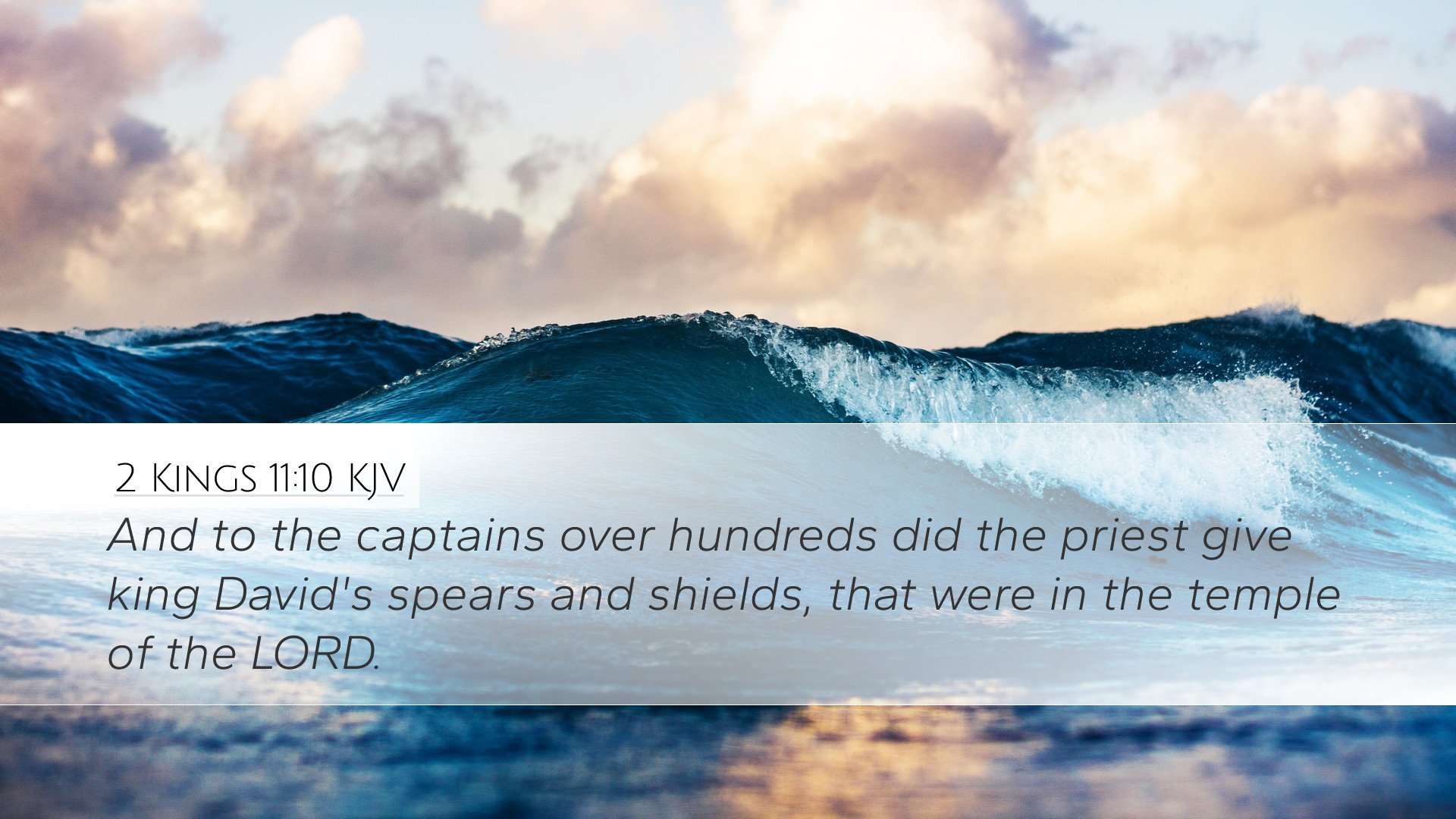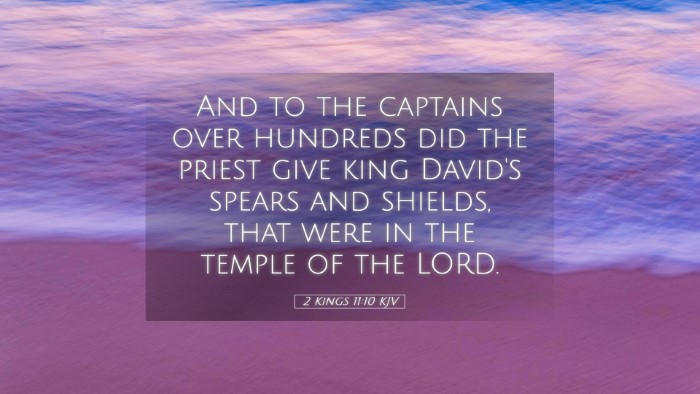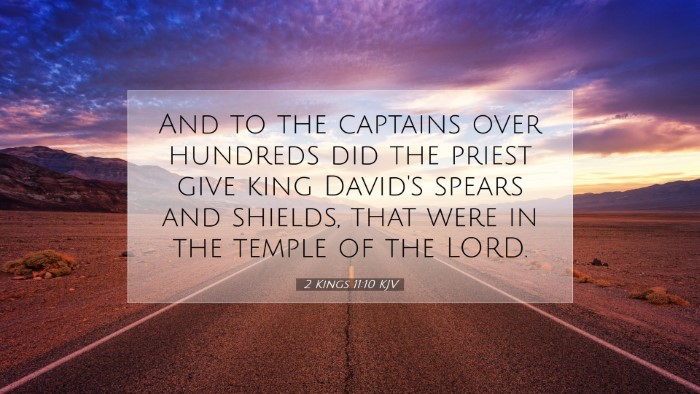Old Testament
Genesis Exodus Leviticus Numbers Deuteronomy Joshua Judges Ruth 1 Samuel 2 Samuel 1 Kings 2 Kings 1 Chronicles 2 Chronicles Ezra Nehemiah Esther Job Psalms Proverbs Ecclesiastes Song of Solomon Isaiah Jeremiah Lamentations Ezekiel Daniel Hosea Joel Amos Obadiah Jonah Micah Nahum Habakkuk Zephaniah Haggai Zechariah Malachi2 Kings 11:10
2 Kings 11:10 KJV
And to the captains over hundreds did the priest give king David's spears and shields, that were in the temple of the LORD.
2 Kings 11:10 Bible Commentary
2 Kings 11:10 Commentary
Verse: "And the priest gave to the captains of the hundreds the spears and shields that had been King David's, which were in the temple of the Lord."
Contextual Background
This verse occurs during a critical moment in Judah's history, as the rightful heir to the throne, Joash, is being protected from the usurping queen Athaliah. Athaliah, the daughter of Jezebel, had seized the throne after the death of her son, Ahaziah. In this tumultuous period, the priest Jehoiada plays a pivotal role in orchestrating a coup to restore the Davidic line to the throne.
Commentary Overview
The implications of this verse stretch beyond a mere transaction of weapons; they embody the themes of divine providence, rightful governance, and the significance of the Davidic covenant.
Divine Providence and Protection
Matthew Henry comments on the protective hand of God in this narrative, emphasizing that the Lord's preservation of Joash was instrumental in accomplishing His promises to David. Joash’s deliverance from Athaliah's wrath was divinely orchestrated, ensuring that the royal line remained unbroken. The weapons mentioned—those that belonged to David—were not only a symbol of kingship but also stood as evidence of God's faithfulness to His promises.
Significance of the Armaments
Albert Barnes notes the importance of the spears and shields in this context. These were not mere instruments of war; they were sacred relics of a past king who had a heart after God. By using David's weapons, Jehoiada was not only rallying the captains of the hundreds to a cause but was also invoking the authority and glory of God's covenant with David. The act of providing these shields and spears signifies a transfer of divine authority and legitimacy to Joash as the rightful king.
Symbolism of the Weapons
- Spears: Represent the readiness for battle and the defense of God's anointed.
- Shields: Symbolize protection and faith, referencing Ephesians 6:16 where faith serves as a shield in spiritual warfare.
The Role of Jehoiada
Adam Clarke elaborates on Jehoiada’s strategic genius and his zeal for the covenant. Jehoiada’s leadership emerges as central during this coup. He not only provides the physical means of defense but also commands respect and loyalty from Israel's military leaders. His action epitomizes the responsibility of the priesthood to preserve and protect God’s covenant people.
The Allusion to the Temple and Covenant
The location of the weapons—temple of the Lord—holds deep theological significance. The temple is portrayed as a sanctuary not just of worship but also of fidelity to God’s promises. By retrieving David’s arms from the temple, Jehoiada signals that the political restoration is rooted in spiritual revival. The priests in this context serve as mediators, bridging the need for military protection with a return to covenant loyalty.
Theological Reflection
This verse challenges pastors, students, and theologians alike to reflect on the sacredness of their calling. Just as Jehoiada employed the physical artifacts of the faith to secure the future of God’s chosen, modern leaders must consider the tools and weapons they wield in their ministries. The word of God, the truth of the Gospel, and the prayers of the saints are our modern-day 'spears and shields'.
Leadership and Authority
The act of Jehoiada in this passage sends a clear message about the nature of leadership. Those tasked with guiding God’s people are called to equip others for battle. This equipping often comes from a rich understanding of Scripture and a deep commitment to God’s overarching narrative. The connection between physical might and spiritual authority highlights the significant dual roles leaders must navigate.
Conclusion: A Call to Faithfulness
2 Kings 11:10 serves as a reminder of the enduring legacy of faithfulness in leadership. The symbols of the past—represented by King David's arms—echo through time, calling each generation of believers to uphold God’s covenant and trust in His promises. As leaders and believers reflect on this moment in Judah's history, they are invited to consider their role within God's grand narrative.
Key Takeaway: There is power in recognizing our past, our heritage, and the divine instruments God has provided us to serve faithfully in the present.


